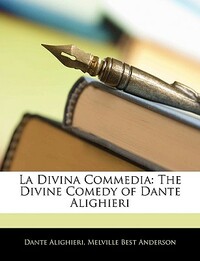You need to sign in or sign up before continuing.
Take a photo of a barcode or cover
311 reviews for:
La Divina Commedia: The Divine Comedy of Dante Alighieri
Melville Best Anderson, Dante Alighieri
311 reviews for:
La Divina Commedia: The Divine Comedy of Dante Alighieri
Melville Best Anderson, Dante Alighieri
Veramente più volte appaion cose
che danno a dubitar falsa matera
per le vere ragion che son nascose.
― XXII, 28-30.
che danno a dubitar falsa matera
per le vere ragion che son nascose.
― XXII, 28-30.
challenging
dark
emotional
mysterious
reflective
slow-paced
Plot or Character Driven:
Character
Strong character development:
Complicated
Loveable characters:
Complicated
Diverse cast of characters:
No
Flaws of characters a main focus:
Yes
After what seems like forever, I have finished Dante's The Divine Comedy II: Purgatory (trans by Dorothy L Sayers). This was a much more difficult read for me. First of all, there is less action. In Hell, there is constant movement from level to level and Virgil and Dante are continually observing punishment in action. There is also, of course, the horrible fascination with watching the punishment fit the crime. Because Hell is set in eternity, there is no time and therefore no time limit on action.
In Purgatory, the movement is less and, in fact, is even limited by the passing of time. Souls working their way through Purgatory are not allowed to move upward on the mountain at night, so Dante and Virgil are forced to stop several times on their journey. Purgatory was also a bit more challenging for me, a Protestant, since I was not familiar with the doctrine. Sayers does an excellent job explaining the doctrine of Purgatory in the introduction and clarifying some mistaken notions that many have. Again, without her introductory passages and excellent notes, I would have been lost.
So far, I would say the Divine Comedy is a beautifully done allegory representing the journey of the soul from sin to knowledge of and repentance of that sin to the eventual acceptance into Heaven. A bit difficult for those of us who aren't inclined to the Classics, but lovely poetry and a well-executed translation go a long way to making it more palatable. Three and a half stars out of five.
This review was first posted on my blog My Reader's Block. Please request permission before reposting any portion. Thanks.
In Purgatory, the movement is less and, in fact, is even limited by the passing of time. Souls working their way through Purgatory are not allowed to move upward on the mountain at night, so Dante and Virgil are forced to stop several times on their journey. Purgatory was also a bit more challenging for me, a Protestant, since I was not familiar with the doctrine. Sayers does an excellent job explaining the doctrine of Purgatory in the introduction and clarifying some mistaken notions that many have. Again, without her introductory passages and excellent notes, I would have been lost.
So far, I would say the Divine Comedy is a beautifully done allegory representing the journey of the soul from sin to knowledge of and repentance of that sin to the eventual acceptance into Heaven. A bit difficult for those of us who aren't inclined to the Classics, but lovely poetry and a well-executed translation go a long way to making it more palatable. Three and a half stars out of five.
This review was first posted on my blog My Reader's Block. Please request permission before reposting any portion. Thanks.
challenging
dark
slow-paced
adventurous
challenging
emotional
funny
reflective
sad
slow-paced
Plot or Character Driven:
Plot
Strong character development:
Yes
Loveable characters:
Yes
Diverse cast of characters:
No
Flaws of characters a main focus:
Yes
A lot more of a grind up the mountain but there are spots of lightness with father-figure Virgil, and the punishments for those in purgatory repenting of their seven deadly sins are almost as interesting and horrible as in hell. Can't believe this was Christian PR back in the day. If nothing else, skip to the end though because shit gets wild when Beatrice (very firmly) takes the reigns.
Graphic: Gaslighting
I was set up to be disappointed when I read Purgatorio—everyone says it's worse than Inferno, and it is. But I was surprised at how much I enjoyed! The beginning is exceedingly beautiful, with descriptions of Dante-the-pilgrim's body as breaking light wonderfully leading into theology of the body and senses. Dante-the-poet's fascination with the ability, or inability, of pagans to achieve mercy is fascinating and sometimes funny (really, the Pope resurrected Trajan so he could become Christian?). The end of the book is also lovely; after Dante's smug, consequenceless romp through purgatory, we see him strongly moved by his love for Virgil and recognition of his own sin. Ultimately it is still less creative and intelligent than Inferno in my opinion—but there's a lot to like!
challenging
challenging
slow-paced
slow-paced
challenging
reflective
slow-paced





